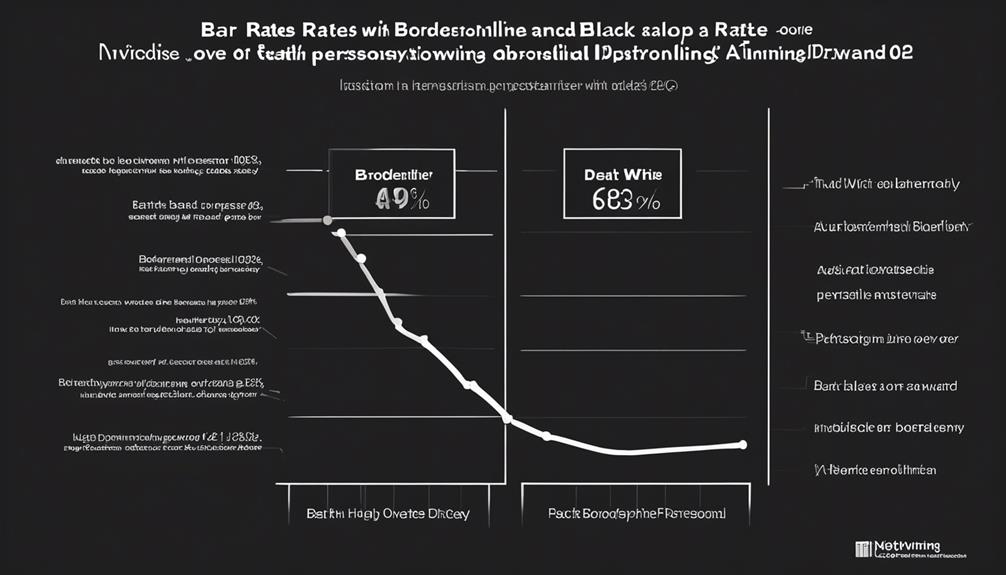We contemplate the possibility of a perplexing question: Will our ex-partner with Borderline Personality Disorder ever contact us again?
The uncertainty surrounding the motivations behind their potential contact can stir a myriad of emotions within us.
While we may yearn for closure or reconciliation, the intricacies of navigating this complex dynamic require careful consideration and introspection.
Stay tuned to explore the nuanced reasons why a BPD ex might initiate contact and how we can prepare ourselves for such an encounter.
Key Takeaways
- Closure may prompt contact
- Watch for regret signals
- Expect intermittent communication
- Prioritize emotional boundaries
Reasons for BPD Exes to Reach Out
When exploring the reasons for BPD exes to reach out, it's essential to consider their underlying motivations and emotional state. Individuals with Borderline Personality Disorder (BPD) may initiate contact with their ex-partners for various reasons. One common motivation is the need for closure. BPD exes might seek resolution for unresolved issues from the past relationship, hoping to find peace and understanding. This desire for closure could also extend to seeking forgiveness for any hurtful actions or behaviors displayed during the relationship.
Furthermore, the act of reaching out could stem from a sense of missing the other person. Feelings of nostalgia and longing might prompt a BPD ex to make contact in an attempt to reconnect with a past relationship. Additionally, some individuals with BPD may reach out as part of their self-improvement journey, aiming to address their emotional issues and work on building healthier relationships in the future.
Setting clear boundaries and managing expectations when interacting with a BPD ex is crucial to safeguarding your emotional well-being.
Signs Your BPD Ex May Contact You

Upon noticing subtle behavioral shifts or emotional cues, one may start recognizing signs that their BPD ex could potentially reach out to them. It's essential to be mindful of these signs as they might indicate a desire for contact, closure, or reconnection.
Here are some signs to watch out for:
- Increased Communication: If your BPD ex begins to reach out more frequently through messages or calls, it could signify a willingness to reconnect.
- Expressing Regret: Your BPD ex might show signs of guilt or remorse for past actions, which could hint at a desire to seek closure or make amends.
- Attempting to Cross Boundaries: Be cautious if your BPD ex tries to overstep previously set boundaries or engages in behavior that caused issues in the past.
Understanding these signs can help you prepare for potential contact and establish clear boundaries to protect yourself if communication resumes.
Understanding BPD Ex's Communication Patterns
Understanding the communication patterns of a BPD ex can provide valuable insights into their sporadic contact behaviors and emotional fluctuations. When dealing with a borderline personality, it's essential to recognize the unpredictability of their contact attempts and the influence of their emotional state on such interactions. By setting clear boundaries and prioritizing personal well-being, one can navigate potential communication from a BPD ex more effectively. Managing expectations plays a crucial role in handling their contact attempts, as their behavior can vary in intensity and frequency. To further comprehend these patterns, let's explore a table highlighting common communication tendencies of BPD exes:
| Communication Patterns | Description |
|---|---|
| Intermittent Contact | Contact may come in bursts or disappear for extended periods. |
| Emotional Triggers | Responses can be influenced by emotional highs and lows. |
| Impulsive Messaging | Sudden messages or calls might occur without warning. |
| Boundary Testing | Testing limits and reactions to assess control and power dynamics. |
Understanding these communication patterns can aid in anticipating and managing interactions with a BPD ex effectively while safeguarding personal well-being.
Coping Strategies for Unexpected Contact

To effectively cope with unexpected contact from your BPD ex, it's crucial to establish and maintain clear boundaries for communication. When navigating unexpected contact, it's essential to prioritize your emotional well-being and handle the situation with care.
Here are some coping strategies to consider:
- Prepare Emotionally: Anticipate the possibility of contact from your BPD ex to prevent feeling overwhelmed if it does happen.
- Keep Conversations Brief: If your BPD ex reaches out unexpectedly, try to keep interactions short and casual to avoid deep emotional entanglements.
- Seek Support: Consider seeking guidance from friends, family, or a therapist to help you navigate the emotions that may arise from unexpected contact.
Moving Forward After No Contact
After establishing boundaries and coping with unexpected contact from your BPD ex, the next step involves focusing on moving forward after implementing no contact. No contact is essential for your emotional healing and breaking free from unhealthy relationship patterns. It allows you to prioritize your well-being and avoid rekindling past difficulties.
Embracing the uncertainty that comes with no contact is a crucial part of the healing process after a BPD relationship. It's normal to feel uncertain about the future and potential contact, but dwelling on these uncertainties can lead to unnecessary emotional pain. Stay committed to the no contact rule to continue progressing in your journey towards healing and moving forward with your life.
Frequently Asked Questions
Do Borderlines Come Back After Discard?
Yes, individuals with Borderline Personality Disorder (BPD) often return after being discarded due to fear of abandonment and emotional turmoil. Their actions may stem from seeking validation, closure, or reigniting the relationship.
The cyclical nature of BPD relationships leads to intermittent contact post-breakup. Impulse control and emotional regulation challenges influence their decisions.
Setting boundaries and prioritizing emotional well-being is crucial when considering future contact with a BPD ex.
Will a BPD Ex Come Back?
We understand the complexity of wondering if a BPD ex will return. It's natural to seek closure or hope for a renewed connection.
While each situation is unique, it's essential to prioritize our emotional well-being. Setting boundaries and approaching any potential contact with caution can help us navigate these interactions with clarity and self-respect.
Will My BPD Ex Ever Reach Out?
We understand the curiosity about future contact with a BPD ex. It's natural to wonder if they'll reach out again. Remember, such individuals may contact us for various reasons. If they do, keep interactions brief and maintain healthy boundaries.
Be mindful of potential manipulation. Setting clear communication boundaries is essential. Approach any future contact cautiously, focusing on self-awareness and emotional well-being.
Does My BPD Ex Miss Me?
When wondering if a BPD ex misses us, it's natural to seek clarity and closure. Understanding their emotions can provide insight into potential contact. Recognition of their feelings might pave the way for healthier interactions.
Yet, it's crucial to prioritize our well-being and set boundaries. By recognizing the complexity of their emotions, we can navigate potential reconnections with caution and self-care.
Conclusion
In conclusion, navigating potential contact with a BPD ex can be challenging yet manageable. By understanding their behavior patterns and setting boundaries, we can approach the situation cautiously.
Remember, communication may happen unexpectedly, so it's important to be prepared and prioritize self-care. As the saying goes, 'hope for the best, prepare for the worst.'
Stay strong and resilient as you move forward on your journey of healing and growth.









